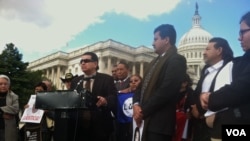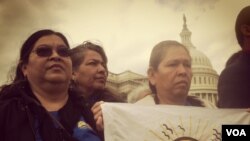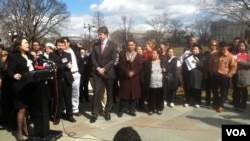WASHINGTON —
A bipartisan group of senators plans to propose the new legislation next month in a bid to better address how the U.S. stops immigrants from entering the country illegally and works with unauthorized immigrants already in the country.
Questions of conduct
Tachiquin said the border is now being patrolled by agents who lack training and haven’t had the proper background checks.
“I want Congress to implement new mechanisms so that the citizens of this country won’t be harassed by the Border Patrol Agency,” he said.
Tachiquin’s 32-year-old daughter Valeria Munique Tachiquin Alvarado, a U.S. citizen, was killed last September by an undercover border patrol agent in Chula Vista, California.
Police say the agent, dispatched to arrest a formerly deported felon embroiled in drug offenses, ended up shooting Alvarado through her car windshield, fearing for his life, after she struck him with the vehicle. The case is still under investigation.
Concerns about the conduct of border agents have grown in recent years, as news outlets expose alleged abuses. Last year, for example, the PBS documentary “Crossing the Line” interviewed a series of witnesses and victims who spoke of torture and sexual and psychological abuse at the hands of border agents. It also showed hidden camera footage of agents pouring out water jugs an aid organization had left in the desert for dehydrated immigrants crossing the border from Mexico.
Jenny Burke, a spokeswoman for U.S. Customs and Border Protection, said the force stresses honor and integrity in every aspect of its mission.
“The overwhelming majority of CBP employees and officers perform their duties with honor and distinction, working tirelessly everyday to keep our country safe,” she said. “We do not tolerate corruption or abuse within our ranks, and we fully cooperate with any criminal or administrative investigations of alleged misconduct by any of our personnel, on or off duty.”
Boots on the ground
Customs and Border Protection has more than 18,500 agents on the border with Mexico and more than 2,200 on the border with Canada, according to the Department of Homeland Security. In addition, unmanned aircraft, helicopters and planes are flying overhead, while thermal imaging systems are in place and a fence stretching more than 1,000 kilometers divides the U.S. from Mexico.
Advocates of the current setup say Customs and Border Protection’s nearly $12 billion budget is well spent because the country is under siege from undocumented immigrants slipping across a porous border that could be penetrated by terrorists, too.
Veronica Escobar, a judge from El Paso County in western Texas, suggested Congress should divert some of the funds spent policing the border to improve accountability and oversight of the people watching it.
She also said taxpayer funds would be better spent on programs promoting commerce and tourism rather than what she called the "militarization" of the border.
“We need to divert the money to help our national economy,” she told the press conference.
Heated debate
Democratic Representative Beto O’Rourke of El Paso said the debate is often most fierce in the House of Representatives’ Homeland Security Committee, where he holds a seat.
“You have people who feel the border is not secure enough and they want to further fortify and militarize the border. Then you have people like me, who live on the border, in the safest city in America,” he said.
Despite this divide, O’Rourke said he felt optimistic that progress could be made after the committee's chairman, Republican Michael McCaul, noted Tuesday that the “border is as secure as it’s ever been.”
O’Rourke said because the border is relatively secure, it opens the possibility of discussing more comprehensive immigration reform, like the kind Tachiquin is pushing.
While members of Congress wage that battle in Washington, Tachiquin wants them to remember the people living that battle every day.
“They need to recognize we’re only human.”
Valentin Tachiquin banged nine times on a metal podium outside the U.S. Capitol Building, the number of times his daughter was shot to death by a border patrol agent last year.
“I’m not a politician, I’m a hurting dad,” Tachiquin, a Hispanic U.S. citizen who works as a corrections officer at the California Institution for Women, said Wednesday. “I would die for this country, but don’t kill my family just because you have a badge.”
A bipartisan group of senators plans to propose the new legislation next month in a bid to better address how the U.S. stops immigrants from entering the country illegally and works with unauthorized immigrants already in the country.
Questions of conduct
Tachiquin said the border is now being patrolled by agents who lack training and haven’t had the proper background checks.
“I want Congress to implement new mechanisms so that the citizens of this country won’t be harassed by the Border Patrol Agency,” he said.
Tachiquin’s 32-year-old daughter Valeria Munique Tachiquin Alvarado, a U.S. citizen, was killed last September by an undercover border patrol agent in Chula Vista, California.
Police say the agent, dispatched to arrest a formerly deported felon embroiled in drug offenses, ended up shooting Alvarado through her car windshield, fearing for his life, after she struck him with the vehicle. The case is still under investigation.
Concerns about the conduct of border agents have grown in recent years, as news outlets expose alleged abuses. Last year, for example, the PBS documentary “Crossing the Line” interviewed a series of witnesses and victims who spoke of torture and sexual and psychological abuse at the hands of border agents. It also showed hidden camera footage of agents pouring out water jugs an aid organization had left in the desert for dehydrated immigrants crossing the border from Mexico.
Jenny Burke, a spokeswoman for U.S. Customs and Border Protection, said the force stresses honor and integrity in every aspect of its mission.
“The overwhelming majority of CBP employees and officers perform their duties with honor and distinction, working tirelessly everyday to keep our country safe,” she said. “We do not tolerate corruption or abuse within our ranks, and we fully cooperate with any criminal or administrative investigations of alleged misconduct by any of our personnel, on or off duty.”
Boots on the ground
Customs and Border Protection has more than 18,500 agents on the border with Mexico and more than 2,200 on the border with Canada, according to the Department of Homeland Security. In addition, unmanned aircraft, helicopters and planes are flying overhead, while thermal imaging systems are in place and a fence stretching more than 1,000 kilometers divides the U.S. from Mexico.
Advocates of the current setup say Customs and Border Protection’s nearly $12 billion budget is well spent because the country is under siege from undocumented immigrants slipping across a porous border that could be penetrated by terrorists, too.
Veronica Escobar, a judge from El Paso County in western Texas, suggested Congress should divert some of the funds spent policing the border to improve accountability and oversight of the people watching it.
She also said taxpayer funds would be better spent on programs promoting commerce and tourism rather than what she called the "militarization" of the border.
“We need to divert the money to help our national economy,” she told the press conference.
Heated debate
Democratic Representative Beto O’Rourke of El Paso said the debate is often most fierce in the House of Representatives’ Homeland Security Committee, where he holds a seat.
“You have people who feel the border is not secure enough and they want to further fortify and militarize the border. Then you have people like me, who live on the border, in the safest city in America,” he said.
Despite this divide, O’Rourke said he felt optimistic that progress could be made after the committee's chairman, Republican Michael McCaul, noted Tuesday that the “border is as secure as it’s ever been.”
O’Rourke said because the border is relatively secure, it opens the possibility of discussing more comprehensive immigration reform, like the kind Tachiquin is pushing.
While members of Congress wage that battle in Washington, Tachiquin wants them to remember the people living that battle every day.
“They need to recognize we’re only human.”






